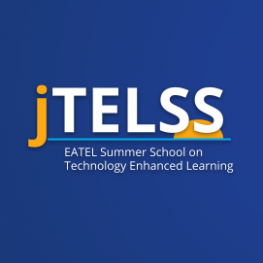Speakers
Roland Klemke
Open University of The Netherlands, The Netherlands / TH Köln, GermanyCorrie Urlings
Open University of the NetherlandsKateryna Holubinka
Open University of the NetherlandsDaniel Majonica
Open University of the Netherlands / Cologne Game Lab, GermanyStart
27/05/2022 - 14:00
End
27/05/2022 - 15:30
Immersive education with VR and digital twins: bridging didactics with AI
Friday 27/05 14:00-15:30h
Main Hall
Abstract
Immersive learning and Virtual Reality (VR) have the potential to improve student understanding, engagement, motivation and learning outcomes thanks to its feeling of presence, representational fidelity and possibilities of active user participation. Its educational potential is intensified when powered with Artificial Intelligence (AI).
In this workshop you will not only learn about various types of VR solutions in education, their features and implications, but will also develop and discuss specific use cases for two learning tools with different degrees and types of immersion – CloudClass project as a low-immersive VR environment, and the MILKI-PSY project as a fully-immersive VR environment with a digital twin.
Apart from that, we will discuss
• the use of AI for educational feedback
• optimal levels or immersion and interaction
• facilitating teaching, social and cognitive presence
• the use of a digital twin
• types of instructions and feedback that need to be provided to interact with a robot in VR
• presenting and providing instructions and feedback to the learner
Needs Analysis
Both VR and AI are burning topics in the educational landscape. And it is important to apply sound theory-grounded evidence-based methodologies in its design, implementation and development in specific educational contexts.
Immersive learning in general and VR in particular have the potential to improve student understanding, engagement, motivation and learning outcomes thanks to its feeling of presence, representational fidelity and possibilities of active user participation. At the same time, using immersive technologies in education should be a balanced decision that considers the positive and restrictive attributes of these tools in specific settings, following sound evidence-based models.
In this workshop, different types of immersive learning environments will be discussed, considering their technical features, usability, the complexity of design, and educational value. Low-immersive (also referred to as desktop VR) and high-immersive VR or iVR (generally involving a head-mounted display or HMD), as well as augmented and mixed reality all have different implications for the learning process. Apart from that, we will discuss the use of AI for educational feedback for learning environments with different degrees and types of immersion at the example of the CloudClass project as a low-immersive desktop VR environment, and the MILKI-PSY project as a fully-immersive VR environment with a digital twin.
In this context, a digital twin is the virtual representation of physical systems that can be used to simulate and predict the behavior of these systems.
Taking into account both theoretical and practical relevance of these topics, we suggest that this workshop features:
1) a lecture-style presentation which sets the background for the use of virtual reality in education;
2) practical collaborative workshop in which each group of participants needs to develop a use case for the given tool, followed by a discussion.
Learning Objectives
- Students will learn about various aspects of educational VR environments with different levels of immersion.
- The use of AI for educational feedback.
- The new opportunities that augmented, virtual and mixed realities open in education.
- Participants will learn to apply specific types of VR in different educational settings.
- Through group-work students will develop use casses for two tools with different levels of immersion – CloudClass as a low-immersive VR environment, and the MILKI-PSY project as a fully-immersive VR environment with a digital twin.
Pre-activities
We are not planning to share any materials before the workshop. Participants do not have to do any activities in advance.
Session Description
Part 1 (15’)
Presentation: immersive education and VR (Kateryna and Daniel together)
– Definition of immersion (technical, psychological, pedagogical perspectives)
– VR environments and their types
– Features of various immersive learning environments
– Implications for education: possibilities and limitations (the right combination of technical requirements; development demands; usability and impact on learning)
Part 2 Groupwork in 2 parallel groups (55’)
Group A (with Kateryna)
Phase 1 – presentation and guided discussion (15’)
• (Briefly present CloudClass project)
• Low-immersive VR for education;
• Elicit CloudClass features, possible contexts of implementation, learning benefits (engagement; conceptual understanding; nonverbal information – immersion in the environment e.g. trip in time…)
Phase 2 – independent group work in smaller groups (3-4 students) (20’)
• come up with a “use case” for the application of CloudClass e.g. learning scenario, lesson plan or an activity.
Phase 3 – whole group discussion (20’)
• briefly present your use cases
• discuss the questions for the final discussion (see below) in the context of your project (CloudClass)
Group B (with Daniel)
Phase 1 – presentation and guided discussion (15’)
• (present MILKI-PSY project)
• artificial intelligence for educational feedback
• human-robot interaction
Phase 2 – independent group work in smaller groups (3-4 students) (20’)
• group brainstorming in small groups (3-4) for use case ideas (assembly / interaction / warehouse)
Phase 3 – whole group discussion (20’)
• briefly present your use cases
• discuss the questions for the final discussion (see below) in the context of your project (MILKI-PSY)
Part 3: Discussion – What are the possibilities and challenges of each tool? (20’)
– features of the tool you got to know
– best contexts of implementation
– what factors should be considered when choosing the tool for a specific educational context?
Wrap-up and the summary
Post-activities
References of the topics will be provided.
Contact information of the PhD students for future collaboration.




